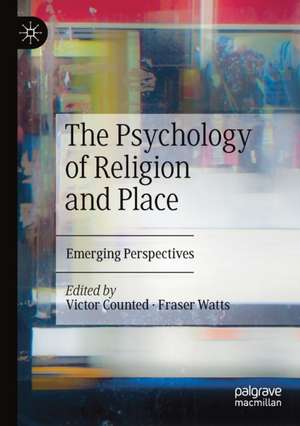The Psychology of Religion and Place: Emerging Perspectives
Editat de Victor Counted, Fraser Wattsen Limba Engleză Paperback – 13 noi 2020
| Toate formatele și edițiile | Preț | Express |
|---|---|---|
| Paperback (1) | 1000.63 lei 6-8 săpt. | |
| Springer International Publishing – 13 noi 2020 | 1000.63 lei 6-8 săpt. | |
| Hardback (1) | 1009.85 lei 6-8 săpt. | |
| Springer International Publishing – 13 noi 2019 | 1009.85 lei 6-8 săpt. |
Preț: 1000.63 lei
Preț vechi: 1220.28 lei
-18% Nou
Puncte Express: 1501
Preț estimativ în valută:
191.49€ • 198.71$ • 160.05£
191.49€ • 198.71$ • 160.05£
Carte tipărită la comandă
Livrare economică 15-29 martie
Preluare comenzi: 021 569.72.76
Specificații
ISBN-13: 9783030288501
ISBN-10: 3030288501
Pagini: 340
Ilustrații: XV, 340 p. 4 illus., 1 illus. in color.
Dimensiuni: 148 x 210 mm
Greutate: 0.47 kg
Ediția:1st ed. 2019
Editura: Springer International Publishing
Colecția Palgrave Macmillan
Locul publicării:Cham, Switzerland
ISBN-10: 3030288501
Pagini: 340
Ilustrații: XV, 340 p. 4 illus., 1 illus. in color.
Dimensiuni: 148 x 210 mm
Greutate: 0.47 kg
Ediția:1st ed. 2019
Editura: Springer International Publishing
Colecția Palgrave Macmillan
Locul publicării:Cham, Switzerland
Cuprins
Chapter 1: An Introduction to the Psychology of Religion and Place
Part I. Theoretical and Methodological Perspectives
Chapter 2: Sacred Places: The presence of the past
Chapter 3: Religion, Place, and Attachment: An evaluation of conceptual frameworks
Chapter 4: Embodied Spirituality Following Disaster: Exploring the intersections of religious and place attachment in resilience and meaning making
Chapter 5: The Psychology and Theology of Place: A perspective from the Judeo-Christian tradition
Chapter 6: Pride of Place in a Religious Context: An environmental psychology and sociology perspective
Chapter 7: Mapping the visible and invisible topographies of place and landscape through sacred mobilities
Chapter 8: ‘A Dwelling Place for Dragons’: Wild places in mythology and folklore
Chapter 9: Religious and Place Attachment: A cascade of parallel processes
Chapter 10: God and Place as Attachment ‘Figures’ – A critical examination
Part II. Empirical Applications and Practical Implications
Chapter 11: Religion, Well-being, and Therapeutic Landscape
Chapter 12: “To Him I Commit My Spirit”: Attachment to God, the Land and the People as a Means of Dealing with Crises in Gaza Strip
Chapter 13: Glimpses of a Place Spirituality in American Filmmaker John Sayles’ Limbo: Authenticity, inauthenticity, and modes of place engagement
Chapter 14: Place-Making and Religion: A solidarity psychology of the commons
Chapter 15: How and Why Environmental and Religious Attachment Matters for Quality of Life
Chapter 16: Defining the psychology of religion and place: A concept analysis
Index
Notă biografică
Victor Counted, PhD, is Research Associate of the Cambridge Institute of Applied Psychology and Religion and teaches at the School of Social Sciences and Psychology, Western Sydney University, Australia.
Fraser Watts, PhD, is Visiting Professor of Psychology of Religion at the University of Lincoln, UK, Executive Secretary of the International Society of Science and Religion and Director of the Cambridge Institute for Applied Psychology and Religion at the University of Cambridge, UK.
Fraser Watts, PhD, is Visiting Professor of Psychology of Religion at the University of Lincoln, UK, Executive Secretary of the International Society of Science and Religion and Director of the Cambridge Institute for Applied Psychology and Religion at the University of Cambridge, UK.
Textul de pe ultima copertă
This book examines the role of religious and spiritual experiences in people’s understanding of their environment, and how their place experiences are transformed in the process. The contributors consider how understandings and experiences of religious and place connections are motivated by the need to seek and maintain contact with perceptual objects, so as to form meaningful relationship experiences. The purpose is not to engage in comparative religion or analyse different religious traditions in relation to place, but rather to understand how people's perceptions of physical, imaginary and transpersonal objects shape their religious and place experiences. This book is one of the first scholarly attempts to discuss the psychological links between place and religious experiences. The chapters provide insights for understanding how people’s experiences with geographical places and the sacred serve as agencies for meaning-making, pro-social behaviour, and psychological adjustment in everyday life.
Caracteristici
Sheds light on the intersection between psychology, religion, and place
Explores the role of attachment in religious/spiritual experiences and the construction of meaning in spatial settings
Considers practical applications of religion and place, including geographical politics and the commons
Explores the role of attachment in religious/spiritual experiences and the construction of meaning in spatial settings
Considers practical applications of religion and place, including geographical politics and the commons
